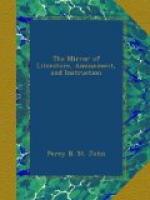* * * * *
ON THE DEATH OF A FRIEND.
Thou art gone to the grave, but we will
not deplore thee,
Since God was thy refuge,
thy ransom, thy guide;
He gave thee, he took thee and he will
restore thee,
And death has no sting since
the Saviour has died.
The Amulet for 1828.
* * * * *
St. Martin’s, near Canterbury.
[Illustration: St. Martin’s, near Canterbury.]
* * * * *
THE FIRST CHRISTIAN CHURCH ERECTED IN ENGLAND.
(For the Mirror.)
The venerable and interesting church of St. Martin is situated on the side of a hill, (named from it,) at the distance of little more than a quarter of a mile from the dilapidated walls of Canterbury. It is generally believed to have been erected by the Christian soldiers in the Roman army, about the time of king Lucius, A.D. 182, and hence is justly esteemed as the first Christian church erected in Britain, and indeed nothing appears to contradict this assertion; for the Britons, before the arrival of the Romans, were, as is well known, in a state of barbarism and idolatry, and their habitations huts of clay and turf; and as to its being built after their departure, I do not think it at all likely, for England was then ravaged and overrun by the warlike clans of its mountain neighbours, and consequently its inhabitants had not time or inclination to erect buildings, when their lives and property were daily in danger. Their successors, the early Saxons, too, I think, cannot claim any pretensions to St. Martin, they being heathens, and unacquainted with the Christian religion. Nor could they, entirely ignorant of Roman materials, have built an edifice completely composed with them.
Here then was a Christian church and a Christian congregation established in Britain full 415 years before Augustin’s arrival; but as St. Martin, bishop of Tours, died in the year 395, this church could not have been erected in his honour; but it might afterwards have been dedicated to him by Luidhard, chaplain to Bertha, wife of Ethelbert, the Kentish king; and this is the more likely, as Luidhard himself was a French bishop.
In conclusion, it may not be unnecessary to state, that though the papists consider Augustin as the apostle of the English, they do not acknowledge him as their first instructor in Christianity; for, as it appears in their service for May 26, Lucius, a British king, wrote to St. Eleutherius, (who was elected priest A.D. 177,) desiring that he might be numbered among the Christians. By whom or by what means this conversion was effected does not appear; but, however, in reply to it, Eleutherius sent the monks Damian and Fryatius into Britain, from whom the king and many of his subjects received the gospel.
SAGITTARIUS.




